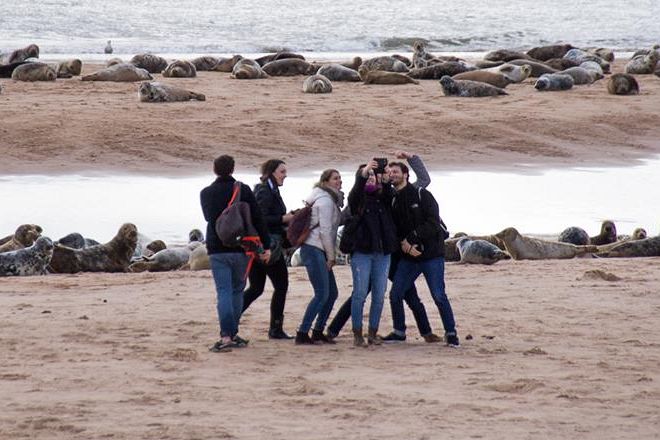Suzanne Kelly got involved in coastal ecology issues when she moved to Aberdeen. She was a community councillor who was on the East Grampian Coastal Partnership, and undertook several campaigns to protect green belt land, animals and she campaigned against the Trump golf course. After recent news stories from around the world, Suzanne talked to some animal experts about the growing problem of people taking selfies with wildlife including Lee Watson of Ythan Seal Watch who supplied the photos and John Robins of Animal Concern Advice Line and Save Our Seals Fund.
Scotland’s wildlife is suffering because of loss of habitat, pollution, dwindling food supplies and poaching in Scotland.
In Aberdeen evidence of poaching was found on Tullos Hill in the summer of 2014. The city has some of Scotland’ most polluted streets.
In Torry, protected species are going to lose shelter, food and water as Nigg Bay becomes industrialised.
In the shire seal populations are supposed to be protected by signs, fences, and warning flags in the sand, but these deterrents are being ignored.
Seals need to ‘haul out’ or rest on the sands for many hours before they take to sea for food again. People are legally bound to leave them alone, yet these seals are bombarded by overhead drones, dogs off leashes, and people finding it amusing to frighten the resting seals back into the water to take videos. This behaviour is prohibited, the signs are clear, and yet people persist.
John Robins of the charities Animal Concern Advice Line and Save Our Seals Fund said:
“People stupid enough to take selfies with wild animals probably don’t care if their idiocy ends in the death of the animal. They are not concerned that their actions cause stress and suffering to animals and the abandonment of young animals by their parents.
“Perhaps they will be more concerned to learn that disturbing animals can lead to the selfie taker ending up in a police cell, a hospital bed or on a slab at the local mortuary. Unless you have a special licence, it is illegal to take photographs of many protected species of animal and bird. Get caught doing that and you will be carted off to the police station.
“Seals, even cute and cuddly pups, have a nasty bite which carries a high risk of very dangerous infections which can lead to long term debility and even death. Many other animals and birds carry zoonosis, diseases including salmonella, e-coli and even rabies which can infect humans. My advice is to use your brain before your camera.”
Animals can be exhausted and in need of rest, frightened, injured, and must be left alone at a large distance. When visiting wildlife habitats, remember to find out the rules in advance, obey any signs, and listen to any directions you are given by any rangers or wildlife officials. Our wildlife is having a hard time – don’t make it harder.
Lee Watson of Ythan Seal Watch has been raising awareness and challenging illegal behaviour for several seasons now. A group of volunteers formed the Ythan Seal Watch and try to safeguard seals and nesting birds. Their Facebook page reads:
“The Ythan Seal haul-out is now designated and the Seals are legally protected from harassment. We will work with the relevant wildlife and law enforcement agencies in support of this and we will continue to film and monitor the Seal haul-out and any irresponsible behaviour.”
If you are aware of any wildlife crime in the UK – illegal hunting, poaching, snaring – anything – please don’t let it go without calling 999 if it is happening now, or 101 for anything else.
- Comments enabled – see comments box below. Note, all comments will be moderated.
